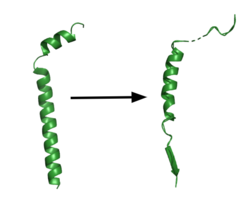We apologize for Proteopedia being slow to respond. For the past two years, a new implementation of Proteopedia has been being built. Soon, it will replace this 18-year old system. All existing content will be moved to the new system at a date that will be announced here.
Sandbox Reserved 1619
From Proteopedia
(Difference between revisions)
| Line 29: | Line 29: | ||
===Active Site=== | ===Active Site=== | ||
| - | The <scene name='83/832945/Asp_257_and_asp_385/7'>active site</scene> is located between TM6 and TM7 of the PS1 subunit, which is mainly hydrophilic and disordered. Each of these transmembrane helices has an aspartate residue, Asp257 and Asp385, which are located approximately 10.6 A˚ apart when inactive.<ref name="Bai">PMID:26280335</ref> The PAL sequence of <scene name='83/832945/Asp_257_and_asp_385/ | + | The <scene name='83/832945/Asp_257_and_asp_385/7'>active site</scene> is located between TM6 and TM7 of the PS1 subunit, which is mainly hydrophilic and disordered. Each of these transmembrane helices has an aspartate residue, Asp257 and Asp385, which are located approximately 10.6 A˚ apart when inactive. <ref name="Bai">PMID:26280335</ref> The PAL sequence of <scene name='83/832945/Asp_257_and_asp_385/9'>Pro433, Ala434, and Leu435</scene> is in close proximity with the catalytic aspartates and is important to substrate recognition. GS becomes active upon substrate binding, when TM2 and TM6 each rotate about 15 degrees to more closely associate and the two <scene name='83/832945/Asp_257_and_asp_385/4'>aspartate residues</scene> hydrogen bond to each other during catalysis. The β-strand of the substrate interacts via main chain H-bonds with the PAL sequence. Asp257 and Asp385 are located 6–7 Å away from the scissile peptide bond of the substrate.<ref name="Zhou">PMID:30630874</ref> |
Revision as of 21:37, 18 April 2020
Gamma Secretase
| |||||||||||
References
- ↑ Yang G, Zhou R, Shi Y. Cryo-EM structures of human gamma-secretase. Curr Opin Struct Biol. 2017 Oct;46:55-64. doi: 10.1016/j.sbi.2017.05.013. Epub, 2017 Jul 17. PMID:28628788 doi:http://dx.doi.org/10.1016/j.sbi.2017.05.013
- ↑ 2.0 2.1 2.2 Zhou R, Yang G, Guo X, Zhou Q, Lei J, Shi Y. Recognition of the amyloid precursor protein by human gamma-secretase. Science. 2019 Feb 15;363(6428). pii: science.aaw0930. doi:, 10.1126/science.aaw0930. Epub 2019 Jan 10. PMID:30630874 doi:http://dx.doi.org/10.1126/science.aaw0930
- ↑ 3.0 3.1 Bai XC, Yan C, Yang G, Lu P, Ma D, Sun L, Zhou R, Scheres SH, Shi Y. An atomic structure of human gamma-secretase. Nature. 2015 Aug 17. doi: 10.1038/nature14892. PMID:26280335 doi:http://dx.doi.org/10.1038/nature14892
Student Contributors
Layla Wisser
Daniel Mulawa

